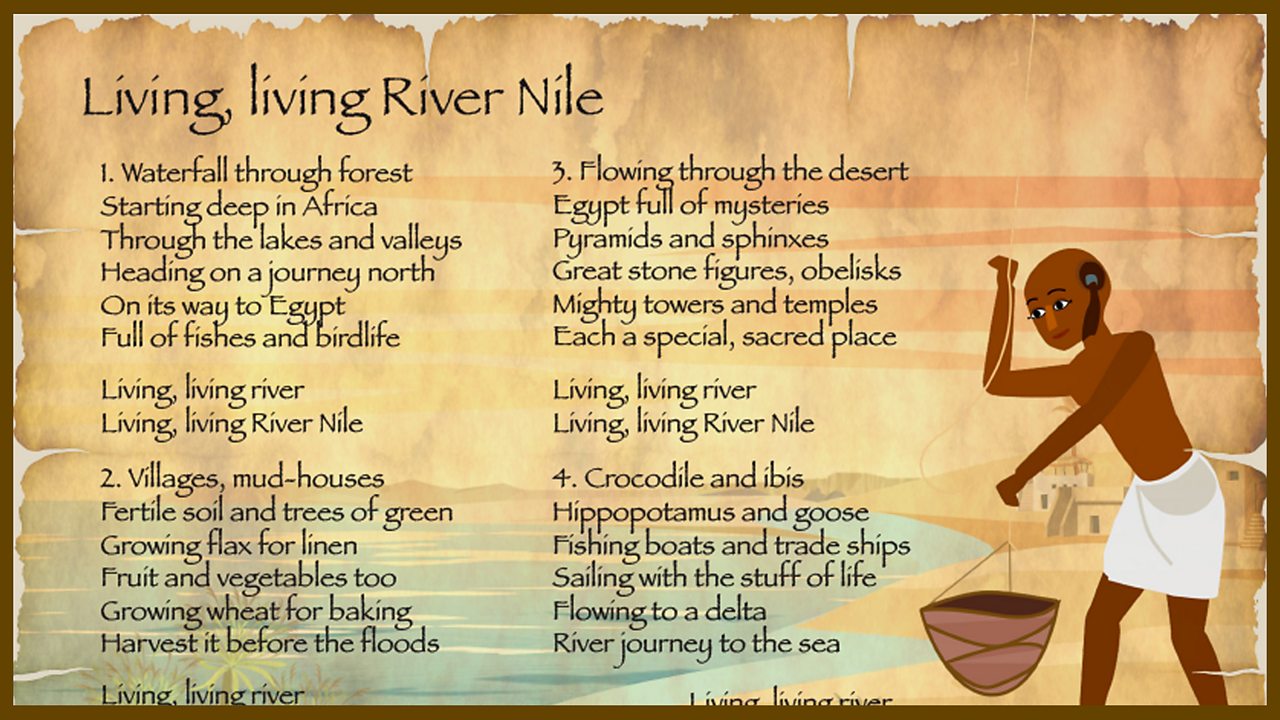Have you ever wondered what the music of ancient Egypt sounded like? Imagine a world where the Pharaohs danced to vibrant rhythms, where love songs were whispered under the desert moon, and where religious hymns resonated through labyrinthine temples. While the exact melodies may be lost to time, the lyrics of these songs, etched onto papyrus scrolls and inscribed on temple walls, offer a captivating glimpse into the hearts and minds of the ancient Egyptians.

Image: www.bbc.co.uk
Exploring these ancient lyrics is like opening a treasure chest of forgotten stories, emotions, and beliefs. Through these verses, we can learn about their daily lives, their religious practices, their love of music, and their profound connection to their world. This article delves into the fascinating world of Egyptian song lyrics, exploring their historical context, stylistic variations, and the powerful messages they convey.
Ancient Egyptian Music: A Glimpse Through the Veil of Time
While the precise musical sounds of ancient Egypt remain elusive, archaeological evidence suggests a rich musical landscape. The Egyptians developed sophisticated instruments like the harp, lute, flute, and sistrum, which were used in both secular and religious ceremonies. Egyptian paintings depict musicians playing these instruments, while hieroglyphic inscriptions provide clues about musical notation and performance practices.
Hymns to the Gods: A Tapestry of Devotion
Religious hymns played a central role in Egyptian life. These songs, often sung in elaborate rituals and processions, were dedicated to the great deities of the Egyptian pantheon. They expressed reverence, praise, and supplication, acknowledging the power and benevolence of the gods. One famous hymn, the “Hymn to the Aten,” dedicated to the sun god, is an awe-inspiring example of a lyrical prayer, capturing the awe and wonder the Egyptians felt for the celestial forces.
These hymns were often structured in a call-and-response format, with a lead singer or priest initiating a chant, which was then repeated by the chorus or audience. The use of repetition and symbolic imagery emphasized the importance of the message and facilitated audience participation. These hymns were more than just musical expressions; they were rituals that bridged the gap between humanity and the divine, reminding everyone of their place within the cosmic order.
Love Songs: Echoes of Romance and Desire
While religious hymns dominated the public sphere, love songs offered a more intimate portrayal of Egyptian emotions. These songs were often about courtship, marriage, and the longing for companionship. Some lyrics are explicitly erotic, hinting at a more liberated view of sexuality compared to some later societies. One example is “The Song of the Harper,” a beautiful ballad where a singer recounts the joys of love, depicting a world where passion and sensuality were embraced.
These love songs often feature imagery of nature, comparing the beloved to the beauty of flowers, the coolness of a spring, or the warmth of the sun. They also reveal the importance of music and dance as part of social interactions and romantic rituals, suggesting that music was a powerful force for courting affection and forging bonds.

Image: ancientegyptianmusicad.weebly.com
Work Songs: The Rhythm of Labor
Ancient Egyptians weren’t just concerned with hymns and love songs. They also had work songs, used to accompany daily tasks and provide rhythm to laborious activities. These songs were more utilitarian, but they still held a certain poetic charm. They often incorporated catchy refrains, call-and-response patterns, and rhythmic movements to keep workers engaged and boost morale. Some songs celebrated the power of teamwork and the strength of community, while others joked about the hardships of daily life.
Funeral Songs: A Farewell to the Afterlife
Death was an intrinsic part of Egyptian life, and the afterlife held great significance. Funeral songs played a vital role in the transition from this world to the next. These were more than mere laments; they were ceremonial chants intended to guide the deceased through the journey to the afterlife. The lyrics often expressed grief, but also conveyed hope for a successful afterlife and reunion with loved ones. They invoked the deceased’s good deeds, the power of the gods, and the blessings of the afterlife.
The Legacy of Egyptian Song Lyrics
While the exact sounds of ancient Egyptian music may be lost, the lyrics themselves serve as a powerful testament to their culture and beliefs. They provide us with a rich tapestry of emotions, experiences, and beliefs about life, love, death, and the divine. These lyrics demonstrate the importance of music in ancient Egyptian society, not just as a form of entertainment, but as a means of communication, ritual, and social cohesion.
Beyond the Lyrics: The Impact of Ancient Egyptian Music
The influence of Egyptian music extended far beyond their borders. Ancient Greek musical theorists were inspired by Egyptian music, and many Greek philosophers, including Plato and Aristotle, theorized about its effects on the soul. Egyptian music was also adopted by other cultures in the Mediterranean region, influencing the development of later musical traditions.
Egypt Song Lyrics
Exploring the Echoes of Ancient Egyptian Music Today
While we cannot recreate the exact sounds of ancient Egyptian music, musicians and scholars continue to explore these lost melodies. Some scholars have attempted to reconstruct ancient Egyptian music using available evidence, while others have created contemporary interpretations inspired by the lyrics and the known instruments of the period. These efforts serve as a bridge between the past and the present, allowing us to experience the power of ancient Egyptian music in a new light.
The beauty of Egyptian song lyrics lies not just in their lyrical content, but in the glimpses they provide into the human experience. These songs offer a window into the ancient Egyptian worldview, revealing their emotions, beliefs, and aspirations. As we explore these lyrics, we are reminded that music, in its purest form, transcends time and culture, and continues to resonate with our own hearts and minds.





